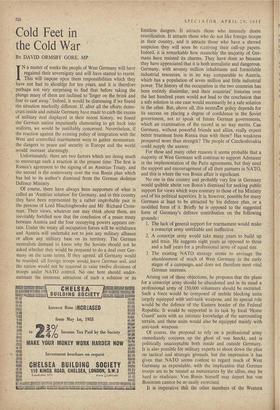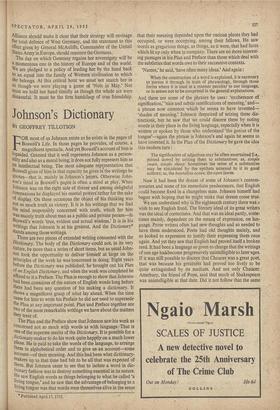Cold Feet in the Cold War '
BY DAVID ORMSBY GORE, MP IN a matter of weeks the people of West Germany will have regained their sovereignty and will have started to rearm. This will impose upon them responsibilities which they have not had to shouldpr for ten years, and it is therefore perhaps not very surprising to find that before taking the plunge many of them are inclined to 'linger on the brink and fear to cast away.' Indeed, it would be distressing if we found the situation markedly different. If, after all the efforts demo- crats inside and outside Germany have made to curb the excess of military zeal displayed in their recent history. we found the German nation impatiently clamouring to get back into uniform, we would be justifiably concerned. Nevertheless, if the reaction against the existing policy of integration with the West and controlled rearmament were to gather momentum. the dangers to peace and security in Europe and the world would increase alarmingly.
Unfortunately, there are two factors which are doing much to encourage such a reaction at the present time. The first is Russia's agreement to the signing of an Austrian Treaty. and the second is the controversy over the von Bonin plan which has led to its author's dismissal from the German skeleton Defence Ministry.
Of course, there have always been supporters of what is called an 'Austrian solution' for Germany. and in this country they have been represented by a rather improbable pair in the persons of Lord Hinchingbrooke and Mr. Richard Cross- man. Their views, whatever one may think about them, are inevitably fortified now that the conclusion of a peace treaty between Austria and the four occupying powers appears cer- tain. Under the treaty all occupation forces will be withdrawn and Austria will undertake not to join any military alliance or allow any military base on its territory. The German neutralists demand to know why the Soviets should not be asked whether they would, bo prepared to do a deal over Ger- many on the same terms. If they agreed. all Germany would be reunited. all foreign troops would leave German soil. and the nation would not be required to raise twelve divisions of troops under NATO control. No one here should under- estimate the immense attraction of such a solution or its nilE31114/'-'7 r"d12;'''' limitless dangers. It attracts those who intensely desire reunification. It attracts those who do not like foreign troops in their country, and it attracts those who have a shrewd suspicion they will soon be receiving their call-up papers. Indeed, it is remarkable how staunchly' the majority of Ger- mans have resisted its charms. They have done so because they have appreciated that it is both unrealistic and dangerous. Germany, with seventy million inhabitants and formidable industrial resources, is in no way comparable to Austria, which has a population of seven million and little industrial power. The history of the occupation in the two countries has been entirely dissimilar, and their countries' histories over the last hundred years would not lead to the conclusion that a safe solution in one case would necessarily be a safe solution in the other. But, above all, this neutrarist policy depends for its success on placing a degree of confidence in the Soviet government,, not to speak of future German governments, which an examination of the record in no way merits. Can Germany, without powerful friends and allies, really expect better treatment from Russia than with them? Has weakness prospered more than strength? The people of Czechoslovakia could ,supply the answer.
For these and many other reasons it seems probable that a majority of West Germans will continue to support Adenauer in the implementation of the Paris agreements, but the' need the support and encouragement of all their partners in NATO, and this is where the von Bonin affair is significant.
No one in this country and probably very few in Germany would quibble abont von Bonin's dismissal for seeking public support for views which were contrary to those of his Ministry and of his political superiors. It is, however, possible for many Germans at least to be attracted by his defence plan, or a modified form of It. Briefly he is opposed to the suggested form of Germany's defence contribution on the following grounds: 1. The lack of general support for rearmament would make' a conscript army unreliable and ineffective.
2. A conscript army would take many years to build up and train. He suggests eight years as opposed to three and a half years for a professional army of equal size.
3. The existing NATO strategy seems to envisage the abandonment of much of West Germany in the early stages of a campaign, and does not therefore meet vital German interests.
Arising out of these objections, he proposes. that the plans for a conscript army should be abandoned and in its stead a professional army of 150,000 volunteers should be recruited. Such a force would be composed of mobile blocking units largely equipped with anti-tank weapons, and its special role would be the defence of the Eastern border of the Federal Republic. It would be supported in its task by local 'Home Guard' units with an intimate knowledge of the surrounding terrain, and these units would also be equipptd mainly with anti-tank weapons.
Of course, the proposal to rely on a professional army immediately conjures up the ghost of von Seeckt, and is politically unacceptable both inside and outside Germany. It is also possible for military experts to shoot down the plan on tactical and strategic grounds. but the impression it has given that NATO seems content to regard much of West Germany as expendable, with the implicatibn that German troops are to be treated as mercenaries by the allies, may be hard to eradicate. Von Bonin himself may depart but von Boninism cannot he so easily exorcised.
It is imperative that the other members of the Western Alliance should make it clear that their strategy will envisage the total defence of West Germany, and the statement to this effect given by General McAuliffe, Commander of the United States Army in Europe, should reassure the Germans. The day on which Germany regains her sovereignty will be a momentous one in the history of Europe and of the world. We are pledged to a policy of leading her by the hand back as an equal into the family of Western civilisation to which she belongs. At this critical hour we must not snatch her in as though we were playing a game of 'Nuts in May.' Nor Must we hold her hand timidly as though the whole act were distasteful. It must be the firm handclasp of true friendship.



















































 Previous page
Previous page